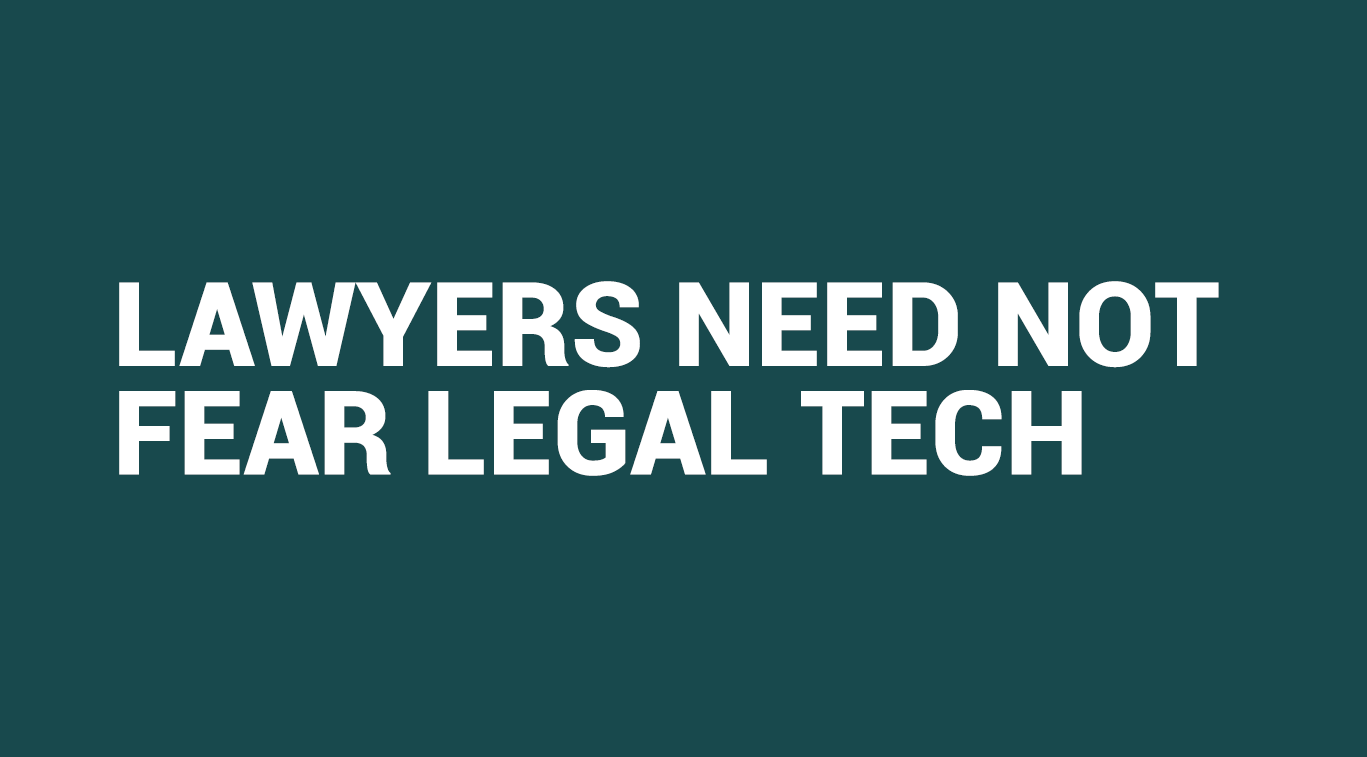Lawyers Need not Fear Legal Tech

Written by Joshua Fraser
Blogger

The last decade has been a momentous time of dynamism and change in the Legal Sector, characterised by rapidly increasing regulation, greater pressures, and technological advancement. This shifting legal landscape, understandably, is liable to cause worries and concerns regarding firms’ and, at a greater level, lawyers’ abilities to adapt to all the transpiring radical change.
Not least of the driving factors that are keeping shrewd and worried lawyers up at night is that of legal technology. While most lawyers believe, implicitly at least, in the power of legal tech to transform their working day for the better, many are skeptical or even fearful of long-term future legal technology. Much of this concern seemingly arises from the belief that technology, while usually revolutionary in the long term can become quickly outdated and almost bureaucratic in its complexity on longer time scales; take, for example, email. The function of Email was revolutionary for law firms, immediately decreasing printing ink and paper costs, as well as slashing the time wastage and loss inherent in the manual and physical delivery of missives and documents. However, despite the ease, expediency, and cost reduction imparted by email as one of the earliest and most useful tools for law, the consequences of its design and benefits have imparted some notable long-term downsides for practicing lawyers. Primarily, email has become more complex for the older generation of lawyers, with phishing emails, spam emails coupled with draconian spam filters that sometimes mistake legitimate emails for spam ones and GDPR laws make what was once a very simple process a headache of complexity and pitfalls. Notably, these annoyances affect younger lawyers, who were raised amongst such technological innovation, less, instead being quotidian facts of life, rather than evolving pain points. Secondly, email has set an expectation of fast and consistent contact. This phenomenon is known as patience erosion and the weight of such an ongoing expectation can lead to lawyer burnout. Such an oppressive presumption of the need for instantaneous email responses must be tackled in order to prevent burnout and many firms have needed to take specific and wide-sweeping work culture reforms to mitigate its effect.
Both of these example pain points illustrate how technology can develop to become a burden, as well as a benefit, something many lawyers and legal staff are painfully aware of. Crucially, current lawyers and legal sector shot-callers face the prospect of living in, as opposed to growing up around, these difficulties. This means they are more likely to struggle with any prospective evolving complexity associated with the relevant legal software tools they are using.
Secondly, and perhaps even more pervasively, many lawyers are wary of the potential for legal tech to replace them in carrying out legal work. As an exemplar and primary threat, the current and prospective impact of AI on the legal profession is hard to understate. This ranges from a surface plane all the way down to a deep conceptual level.
In the latter case, the law is, to a greater and lesser extent, a series of rules and requirements stipulating what a specific outcome should be from a given situation. This, as many technology analysts have pointed out, is highly reminiscent of machine logic, where coding, particularly in its conceptual and pseudo form, involves a series of conditions. Indeed, even legal test stables such as ‘but for’ are evocative of the coding conditional statement ‘if/else’ then do; meaning, for example, if a condition is true do action and if any other condition is the case then do not do the otherwise required action. As an intuitive rule of thumb, the closer a task’s internal logic is to computer logic then the easier the task will likely be to be automated. The above comparison suggests that legal analysis and perhaps even judicial judgments can, theoretically, be automated.
This, of course, raises an interesting and oft unnerving question for lawyers and legal service providers as a whole; if, theoretically, their function, and by extension their job, of providing legal analysis and advice can be automated in a manner that practically excludes their need to be involved, then what purpose do they serve and where do they fit in, in the legal service provision process? Certainly, if an AI was able to totally replace manual, human, legal analysis with a robotic digitised version, then it is conceivable that lawyers might go the way of ‘human computers’ who served to perform complex mathematical calculations by hand, using abacuses, note systems, and human skill to take weeks to perform calculations that digital computers can do in seconds today.
Such an eventuality is considered by lawyers precisely because of the leaps and bounds AI has made in the example fields of due diligence and AI legal document review. Indeed, Tom Giradi, an esteemed US civil litigator, argued that one day not using AI in the process of legal analysis could be considered a form of malpractice. This is certainly quite an assertion, but not an outrageous one, given a lawyer’s duty to provide the best standard of service to their client as they can, and the likely irrationality of not using the best tools available to serve their client.
Despite these lofty claims and deep concerns, regarding the future, the legal sector of the future is unlikely to unrecognisable (read as code for lawyerless) due to legal tech tools, such as artificial intelligence in the legal sector. Lawyers’ workloads may be greatly reduced, but they are unlikely to be removed from their hands altogether. It is true that many elements of the law are repetitive and potentially algorithamble, but there is both a human factor and an element of subjectivity that are overlooked. Humans need to be able to relate to those they work with in order to trust them and get the most out of a transaction, both financially and emotionally. This cannot be achieved without informed human interaction – the kind a human lawyer can give, not a machine. Further, some legal processes, such as standards of unconscionability or reasonableness are benchmarkable, but far from strict enough to reduce to a set of clear-cut rules. Being able to automatic such subjectivity borders on the impossible at this stage. For legal technology to fully displace lawyers in these dual and highly important manners it would require an AI that could pass the Turing test and possess capabilities of self-evolving logic, feats that as both very very difficult, if not impossible, to achieve. More likely, legal artificial intelligence and another legal tech will make many legal support roles, such as office administrator and paralegal, redundant and make a lawyer’s life easy, not harder by putting them out of a job.
Now that we have established that lawyers need not worry about being put out of a job, it is also important to mention that any aforementioned concerns that legal technology will evolve to create pain points of its own, can and should be assuaged by good legal tech provider, who can constantly modify and adjust their system, in-line with their client’s concerns, to mitigate and compensate for difficulties suffered.
In conclusion, legal technology should not be feared by lawyers. It will not make their jobs harder, quite the contrary, and it is very unlikely, for the foreseeable future at least, to put them out of a job.
References:
[1] ‘“Harder than Expected” to reduce legal work to a lawyer-free process’, at https://www.legalfutures.co.uk/latest-news/susskind-harder-than-expected-to-reduce-legal-work-to-lawyer-free-process
[2] ‘Will A.I. Put Lawyers Out of Business?’ at https://www.forbes.com/sites/cognitiveworld/2019/02/09/will-a-i-put-lawyers-out-of-business/?sh=212d222831f0
[3] ‘The Fears and Fallacies of Legal Technology’ https://journal.law.upenn.edu/issue/winter-2021/the-fears-and-fallacies-of-legal-technology/
[4] ‘Legal Tech and AI: Understanding the Fears Shared by Legal Professionals’, at https://www.lexcheck.com/resources/legal-tech-and-ai-understanding-the-fears-shared-by-legal-professionals-lc
[5] ‘Why is the legal industry so resistant to tech. Or is it?’ at https://www.regpac.com/single-post/why-is-the-legal-industry-so-resistant-to-change-or-is-it
[6] ‘Fear not: future of lawyering lies with you’ at https://www.lawgazette.co.uk/features/fear-not-future-of-lawyering-lies-with-you/5111378.article
[7] ‘Myth-busting in-house legal tech: I’m a Luddite’ at https://www.shoosmiths.co.uk/insights/legal-updates/myth-busting-in-house-legal-tech-im-a-luddite
[8] ‘Legal tech: Beyond the myths #1’ at https://altior.co.uk/how-will-ai-impact-the-legal-sector/
[9] ‘Lawyers could be replaced by artificial intelligence’ at https://www.cnbc.com/2017/02/17/lawyers-could-be-replaced-by-artificial-intelligence.html
[10] ‘Why Lawyers Have Nothing to Fear from Machine Learning’, at https://www.lawpracticetoday.org/article/lawyers-nothing-fear-machine-learning-ai/








